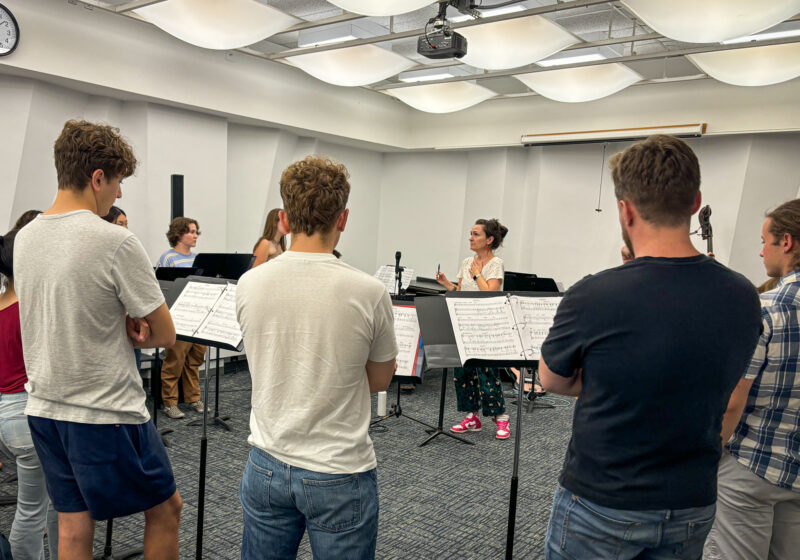Not a trace of the thunderous applause from just a moment earlier lingers in the air; instead, the crowd is hushed, breath caught in their chests for fear of breaking the spell. It’s the inaugural Sisters in Jazz conference at the Eastman School of Music, and Sara Gazarek — vocalist for the Emmy-winning band säje and Associate Professor of Jazz Voice — has just stepped up to the mic.
All eyes lie on Gazarek. “Looking out on the stage and seeing a female president, interim president, and dean — I just felt so inspired,” she had said earlier, referring to Eastman’s class convocation a few weeks prior.
Now, as Gazarek begins to sing, it is quiet. She is swaying softly, a hand to her chest as if to keep herself centered. When the climax rises, her warm smile gives way to squinting, eyebrows knitted in effort, and full-throated riffs. Gazarek is a captivating performer, unafraid to lend herself fully to the song both vocally and physically in a way many female performers are encouraged to mask. As the song comes to a close, no one moves; it is as if the slightest breath would pop the bubble of awe that has descended over them. Then the applause begins to fill the room, and the moment dissipates.
As Eastman’s first Jazz Voice faculty member, she is now given the reins (and responsibility) to guide Eastman’s first-ever class of undergraduate Vocal Jazz students to their own artistic values.
“I am very driven by authenticity and emotional connection,” she said. “With any art you’re creating, it’s not to impress anyone, it’s to create a space where your audience can see themselves reflected and [to] heal humanity. I don’t feel like it’s just about me.”
While Gazarek has very strong beliefs on where her own art should come from, she stresses that she doesn’t plan to impose her value systems on students; rather, she aims to give them a strong base of foundational techniques and allow them to find their own values on the pathway there.
For Gazarek, who started at the University at the beginning of the semester, Rochester is uncharted territory that is hers to map out. She is no stranger to the trials of establishing herself as a woman in a male-dominant field — having performed as a solo artist for years as well as being one-fourth of GRAMMY award-winning vocal quartet säje — nor is she new to teaching vocal jazz to eager students, having been a professor at the collegiate level for 13 years.
However, the opportunity she is stepping into at Eastman has her front and center: creating the curriculum, recruiting students, and tailoring the degree to her specifications.
Gazarek was hired to start part-time on developing the curriculum last year.
Gazarek advertised the program on her social media accounts and taught free trial lessons to drum up interest in auditioning for the program. Of those lessons, around half auditioned, and the current cohort of students totals seven.
Despite the work she’s put in to build the best program possible for her new cohort, Gazarek still has some doubts about herself:
“Eastman has built their private instruction studios to model classical teaching, where a student would be with a teacher for four years. And my challenge with that is that as a person [is] … Do I have enough to offer anyone for four years?” she said. “And part of me just has to trust, ‘Yes, you do, you’ll be okay.’ I trust myself, and I know I will have a lot to offer these students, and I’m excited to explore what some of those things might be, and to grow with them. I’ve never had that opportunity [before].”
Gazarek is committed to building a program that prioritizes practicality — teaching in a way that reflects how vocalists learn rather than what is easiest to conceptually teach — from the ground up. Much of this is done through her own voice, which she uses to sing out sections with the phrasing that she wants (and, on the other hand, exaggerate examples of pitfalls to avoid).
To Gazarek, the flexibility she’s been granted to shape the degree to her own standards at such a prestigious school is a very unusual opportunity. Prior to her arrival at Eastman, Gazarek helped develop the jazz voice major at USC Thornton – however, the school didn’t allow her to have nearly as much freedom.
“At USC […] I was not in any kind of position of power, and they weren’t interested in creating a position for a vocalist to create any kind of change or reflect on what might benefit the vocalists, so there wasn’t curiosity around creating something new. They didn’t want to grow the program, and they wanted singers to fit into what was already being taught.”
USC and other schools present jazz through the veil of classical music because they feel that it is the easiest method to teach; here at Eastman, Gazarek has been able to lift that veil and teach jazz as a cultural art in its own right, which is how she believes it should be done.
“It’s really cool to be here and, essentially, see open arms,” she said, noting the school’s receptiveness to her innovative teaching style. “The crux of the [Vocal Jazz] degree is looking at what I was taught in school and saying, ‘What do I wish I had learned?’”
Now, about a month in, the program is in full swing, complete with theory courses, solo workshops, and a brand-new vocal jazz ensemble. The ensemble, which hosts rehearsals in Gazarek’s classroom space for two and a half hours on Monday and Wednesday afternoons, focuses on the nitty-gritty of vocal pedagogy — placement, delivery, breath support, and more — all run by an incredibly dedicated and excited professor with strawberry earrings and hot-pink high-top Nikes.
Junior Caleb Meyerhoff, who studies Music Education at Eastman, is one of the classical musicians in the vocal jazz ensemble. Though he’s looking to pursue a career in opera, his participation in the ensemble isn’t just for fun.
Instead, Meyerhoff mentioned that his time learning cross-disciplinary techniques have enhanced his approach to his classical repertoire — for example, thinking about how to phrase lines and keep a more consistent internal rhythm in Baroque pieces.
“Classical music has a respect for the composer and honors the composer most. Jazz honors the individual most,” he said. “It’s refreshing to go between the two because the more you can explore yourself, the more you can explore other people, and so you can explore those classical composers […] and try to relate it to yourself.”
Even further from the Jazz Voice department is River Campus junior Britton Ambrose, the only non-Eastman student in the ensemble. Ambrose first met Gazarek in a workshop she did for his a cappella group, the YellowJackets, and was immediately taken with her commitment to her craft and attention to detail.
For students like Ambrose, the gift of being in an ensemble with Eastman students and a Grammy-award winning professor is twofold: Not only is he learning at a high caliber, but he’s consistently challenged to think and practice like a full-blown conservatory student.
Gazarek’s goal is to help all her students find their voices and internal value, both functionally and personally. “I feel like it’s the performer and the arc you’re creating — it’s an art to which people can see themselves reflected in. I’m balancing helping students find themselves on that road with a baseline of function and facility,” she said. “They have to see their own value, they have to understand that they are the arbiters of their own sense of value and artistic place in the world. My job is to push them to see that in themselves.”
Additionally, the introduction of Gazarek to the Eastman faculty reinforces a new but continual expansion of female professors in Eastman, both overall and in the JCM department. To commemorate this growth, the Sisters in Jazz conference (which occurred on Sept. 21-22) was created to give female musicians the opportunity to see and learn from women in jazz.
Among these women are Professor Christine Jensen, a renowned trombonist and professor at Eastman for the past two years. According to Jensen, Sisters in Jazz Day was particularly important for the young women who attended to see current active female performers.
“I believe we need a curriculum overhaul in the JCM studies,” she said. “The department is growing and jazz is constantly evolving. Students need as much contact as possible with as many teachers as possible in this field. It is a language [that] is learned through as much contact as possible on the stage with other musicians. Outside of private studies, this includes jamming, performing live, and meeting as many players and mentors as possible.”
Echoing this sentiment, Associate Dean Reinhild Steingröver mentioned the importance of events like Sisters in Jazz: “With full support from Dean Sheeran, recent appointments of Professors Jensen and Gazarek, and enthusiastic allies volunteers from across our school, I know we will reach our goal of supporting female-identifying jazz musicians from pre-collegiate to collegiate study and beyond for greater equity in the profession,” she said. “Change-making takes a long view and all of us. I believe it is happening here.”
In addition to the performances, the event included masterclasses for jazz instrumentalists and vocalists for interested community members to attend. One of the students who attended, Carly Greavette, is a junior in high school who crossed the border from Niagara, Canada to attend.
“Seeing what is possible for future female musicians was so exciting. I have done similar workshops before through my school and community; however, this event was a whole new side of jazz. It emphasized the importance of female musicians everywhere and that was a real takeaway for me,” she said.
All of these opportunities — and the ability to facilitate them — have further reinforced Gazarek’s love of teaching.
“I’m curious to see how they develop,” she said about her new students. “[They] are a reflection of my ability to guide [them], and I’m a champion for them.”






